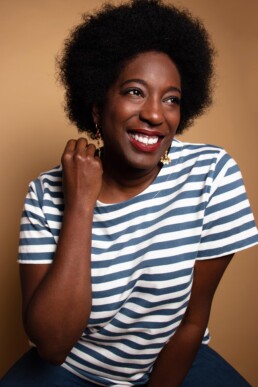City life | By Mickella Nikoi | Image © Suzy Hopper
Mixed Up: Our journey as an interracial couple
At a time when racial equality is at the forefront of public debate, one might assume it is a social issue that needs to be reconciled in the social sphere. But what if it were much closer to home?
Alex Court and Tineka Smith (both International Journalism, 2011) are an interracial couple who met during their time at City. They are now married and their first audiobook ‘Mixed Up: Confessions of an Interracial Couple’, will be published by Audible later this year. The production explores privilege, prejudice and their roles in dismantling institutional racism.
In this interview, Alex and Tineka share insights from their creative process and some of the experiences they faced as a couple.

What was your wedding like?
Tineka: Prior to our wedding day, we had met each other’s families but we were nervous about them meeting each another. We did not know if their different races and cultures would get in the way of bonding, humour (British vs American) or even just understanding each other. Thankfully, it went smoothly and our families absolutely loved one another. For us, the differences in race, culture and traditions made the wedding fun and totally unforgettable. Everybody wanted to learn from and understand each other and celebrate our marriage in a united way. After the wedding, Alex’s parents did a few weeks road trip through the surrounding States to see a bit more of America and learn about its history. For instance, they visited the National Museum of African American History and Culture in Washington, DC. That not only made a big impression on them but also on me as they were making an effort to understand my background.
The day after our wedding, many of my family members applied for their very first passport. They said it was because of meeting Alex and his family and international friends that had inspired them.
How did the proposal for Mixed Up come about?
Tineka: In 2016 we created Huetribe, a multicultural and LGBTQ greeting card line, which addresses the gaps of racial, cultural and sexual representation in the greeting card market.
We started Huetribe because we noticed that interracial and LGBTQ couples were grossly underrepresented on greeting cards, even from brands that cater to the minority market. The fact is that stores are reinforcing the perception and stereotype that the accepted ‘norm’ of a loving relationship must be romantic, white and heterosexual, whether they mean to or not.
As Huetribe grew and we met other interracial couples, we started to talk about interracial relationships and our experience as an interracial couple. We decided it would be cool to try and write a book where we interviewed interracial couples about their experiences. One of our friends introduced us to a literary agent at a party and when we asked her advice, she told us that many people would want to hear about our personal experiences. She gave us tips on how to write a book proposal and helped us shape our experience into a story that would be of interest to publishers. Two months and 50 pages later, we submitted a draft to the literary agent and she offered us representation right away!
We know that we are very lucky as it can take authors years to find an agent and even longer to find a book deal. However and as clichéd as it sounds, our advice for anyone wanting to secure a book deal is to find an agent who really believes in their work. One important thing is having a narrative tone and strong writing skills and we can say it absolutely helped for us to have a journalism background and many authors do.
What can listeners expect to learn from Mixed Up?
Tineka: By sharing our experiences, we hope our listeners understand that everybody, regardless of skin colour, has an important role to play in dismantling institutional racism and that this often starts at home. For instance, many people believe that there is no racism in Europe when in fact, it can be quite overt. In our audiobook, we share some experiences of racism and prejudice in Europe as well as in America.
Finally, we hope that those listening will learn how important it is to celebrate the diversity that is humanity.

What challenges did you face in creating Mixed Up and were there any lessons learned?
Alex: I found articulating the perspective on my own white privilege especially difficult. Racial discrimination is so wrapped up in perspective that it was difficult for me to detach my authentic views on certain interactions we describe in the book from views I think I should have. We live in a charged world where people are often judged for their views if they are not politically correct, but the reality is we are human and we are learning all the time.
Over the two years of writing Mixed Up, we learned a lot. We now know that it takes courage to put yourself out there in the public eye, but that we are only going to progress as a society if we are honest both with ourselves and our partners.
You mention in the press release that being in an interracial relationship does not erase racial problems and misunderstanding. Could you tell us about issues that you have been faced with, which perhaps you were not aware of before becoming a couple; and how you continue to manage them?
Alex: We do not have all the answers. We are still learning how to respond best as a couple when we are confronted with racist or ignorant attitudes. For instance, Tineka recently decided to cut her hair and go natural. She loves it. We recently went to a gym class together and the trainer, a friendly white man, grabbed Tineka’s afro without permission. Tineka abruptly told him to stop and that it is not right to touch someone else’s hair because it looks different and that it is a racially charged action. The trainer was a little offended and defended his action. I felt stuck in the middle. On one hand I could sympathise with Tineka, it is invasive when people want to touch you because they think you look exotic. On the other hand, I could also understand the fitness trainer’s perspective: he only wanted to be friendly, engage with his clients and form a relationship with us. Tineka wanted me to immediately defend her but I also wanted to be polite and diplomatic. When I tried to explain the other perspective, Tineka became angrier.
It is frustrating that each time we are confronted with racist attitudes we do not have the perfect response ready to deploy, but we are managing issues of allyship and making progress to understand each other by talking, debating, arguing and of course writing.
As a couple, what advice would you give to your younger selves?
Alex: Recognise that your partner lives through situations differently from you. Even if you are in the same place, at the same time, talking to the same people, accept that your role is to listen and to try to understand, but know that you will not get it all. It is not that you are ignorant, you just have a different set of life experiences but that does not mean you are useless either. Racism can be both overt and subtle, sometimes you will recognise it plain and simple but at other times you will need someone who is more in tune with racial discrimination to guide you through microaggressions and explain their context.